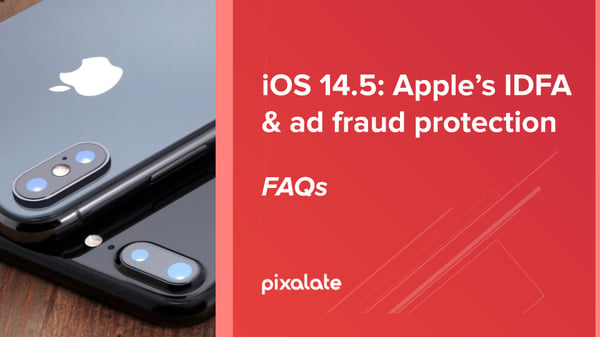
This week's review of ad fraud and quality in the digital advertising space.

Apple has released iOS 14.5, making IDFA opt-in only. Pixalate’s opinion is that all app developers will implement the AppTrackingTransparency framework or risk being delisted from the App Store and ask for the required permissions to track a user’s device advertising identifier.
Read our blog and our IDFA change FAQ to learn more about the update, its impact on ad fraud protection, and Pixalate's approach.

In this piece, The Drum examines the growing threat of ad fraud in Connected TV (CTV). "While CTV ad inventory presents new, high-value opportunities for marketers, it offers comparably attractive opportunities for fraudsters and bad actors," The Drum wrote.

Adweek walks readers through everything they need to know about Apple's iOS 14.5 update and the privacy changes that come with it. "Experts predict a marked reduction in the availability of Apple’s mobile ad ID, the IDFA, a key signal used to serve targeted in-app ads," wrote Adweek.

"Facebook and Google are failing to crack down on fraudulent ads placed on their platforms, even after users have reported them, new research shows," reported Business Insider.

"The YouTube TV app may be disappearing from streaming-TV platform company Roku," reported The Motley Fool. "[I]t's important to note that Roku competes directly with Google's Chromecast platform, but Roku is far ahead. According to a recent study by Pixalate, a programmatic ad monitor, 49% of all programmatic streaming-TV ads flow through Roku's platform.
*By entering your email address and clicking Subscribe, you are agreeing to our Terms of Use and Privacy Policy.
These Stories on Weekly Recaps
*By entering your email address and clicking Subscribe, you are agreeing to our Terms of Use and Privacy Policy.

Disclaimer: The content of this page reflects Pixalate’s opinions with respect to the factors that Pixalate believes can be useful to the digital media industry. Any proprietary data shared is grounded in Pixalate’s proprietary technology and analytics, which Pixalate is continuously evaluating and updating. Any references to outside sources should not be construed as endorsements. Pixalate’s opinions are just that - opinion, not facts or guarantees.
Per the MRC, “'Fraud' is not intended to represent fraud as defined in various laws, statutes and ordinances or as conventionally used in U.S. Court or other legal proceedings, but rather a custom definition strictly for advertising measurement purposes. Also per the MRC, “‘Invalid Traffic’ is defined generally as traffic that does not meet certain ad serving quality or completeness criteria, or otherwise does not represent legitimate ad traffic that should be included in measurement counts. Among the reasons why ad traffic may be deemed invalid is it is a result of non-human traffic (spiders, bots, etc.), or activity designed to produce fraudulent traffic.”

